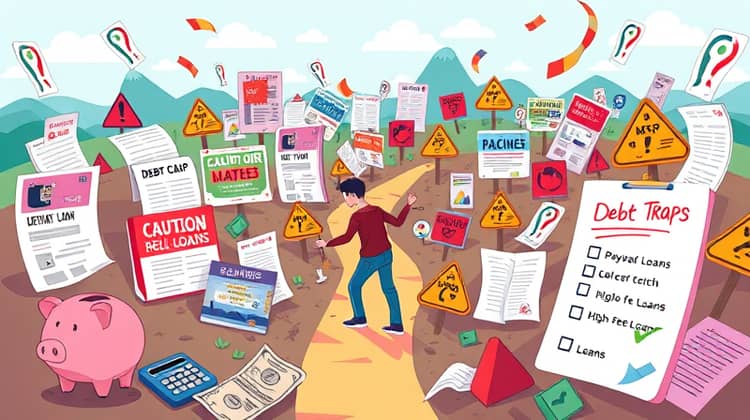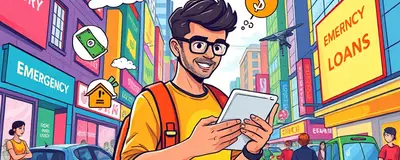Loan Repayment: 10 Proven Tips to Clear Your Debt Faster

Debt can often feel overwhelming, but with the right strategies in place, you can take control of your finances and clear your loans more quickly. There’s no one-size-fits-all approach, but implementing these ten proven tips can set you on the right path to financial freedom. By breaking down your repayment plan and making informed decisions, you can work towards a debt-free life with confidence.
Each step outlined in this article is designed to empower you to tackle your debt head-on. From creating a budget to staying motivated, you'll discover practical advice aimed at restructuring your financial habits. Let's dive into these essential steps and learn how to expedite your loan repayment process.
1. Create a Budget

A budget is your blueprint for managing your finances. It allows you to see where your money is going and helps identify areas where you can cut back to allocate more funds toward loan repayment. Start by outlining your monthly income and expenses, and be mindful to track your spending habits regularly.
Once you have a clear picture of your financial situation, categorize your expenses into essential needs and discretionary spending. This will help you pinpoint areas where you can save money to increase your payments towards your debts. An effective budget will keep you accountable and encourage better financial discipline.
- List all sources of income
- Record fixed and variable expenses
- Identify non-essential spending
- Determine how much you can allocate towards loans each month
With your budget established, you have a clear path to follow. This organized system will enable you to prioritize your debt repayments and ensure you are consistently putting money toward them.
2. Understand Your Loans

The first step to effectively managing your debt is to understand the specific terms of your loans. Know the interest rates, payment schedules, and how each loan impacts your overall financial situation. Understanding the details helps you become proactive in your repayment processes.
Make a list of all your loans, including their balances and interest rates. This will give you insight into which debts should be prioritized based on their cost and terms.
- Identify the types of loans you have (e.g., student loans, credit cards)
- List the interest rates associated with each loan
- Understand the repayment terms and conditions
- Know the penalties for missed payments
Taking the time to understand your loans will not only reduce your anxiety but also equip you with the knowledge needed to develop effective strategies for paying them off.
3. Refinance or Consolidate

Refinancing or consolidating your loans can significantly lower your interest rates and simplify your payments. This process involves combining multiple loans into one, resulting in a single monthly payment that’s typically more manageable or offers better terms.
Before making a decision, research various options available to you. Weigh the pros and cons to determine whether this step is right for your financial situation.
- Evaluate your credit score before applying
- Compare different refinancing options
- Look for no or low fees
- Consider the length of the new loan term
By refinancing or consolidating, you can potentially save money on interest and reduce your monthly obligations, allowing you to pay down your debt faster. Make sure to regularly revisit your financial goals and adjust accordingly as your situation changes.
4. Choose the Right Repayment Plan

Selecting the right repayment plan is crucial in managing your debts effectively. Different loans offer varying repayment options; exploring those can help you align your repayments with your financial capabilities. Whether you opt for a fixed or flexible plan, choose one that suits your income flow and debt level.
Consider your comfort level with risk and your long-term financial objectives. If you expect your financial situation to improve, you might opt for a plan that offers lower initial payments while allowing for larger contributions later on.
- Research available repayment options for each loan
- Evaluate the benefits of income-driven repayment plans
- Consider long-term financial goals
- Analyze your capacity to make larger payments
Selecting an appropriate repayment plan can provide the necessary structure to keep you on track while minimizing financial strain.
5. Make Extra Payments

One effective way to accelerate your loan repayment is by making extra payments whenever possible. Even small additional contributions can significantly reduce your loan balance and the amount of interest you will pay over time.
Set a goal to contribute extra payments into your budget each month, focusing them on the loan with the highest interest rate for optimal results.
- Ensure your lender allows extra payments without penalties
- Designate extra payments toward principal balance only
- Schedule regular additional payments
- Keep track of saved interest and updated loan balance
By consistently paying more than the minimum required amount, you will shorten the life of the loan and save on interest, hastening your journey to becoming debt-free.
6. Cut Unnecessary Expenses

Identifying and cutting unnecessary expenses from your life is a straightforward technique to create extra money for loan repayment. Review your spending habits closely and question what you genuinely need versus what you can live without.
Start small - even cutting out a few luxuries here and there can lead to significant savings that can be redirected to your loans.
- Cancel unused subscriptions or memberships
- Limit dining out and online shopping
- Opt for cheaper alternatives for regular expenses
- Cut back on entertainment costs
With these adjustments, you’ll find that you can free up additional funds that can go towards your loan payments, helping you clear your debts faster.
7. Boost Your Income

Increasing your income can provide a significant boost to your loan repayment efforts. Explore different avenues like taking on a side job, freelancing, or asking for a raise at your current job. Any additional income you earn can be allocated directly towards your debt.
Think creatively about your skill set; there are numerous ways to monetize your talents and time, even if just on weekends or evenings.
- Consider taking on freelance work or side gigs
- Sell unused items around your home
- Engage in part-time work
- Utilize skills for tutoring or consulting
Increasing your income not only accelerates your repayment timeline but can also alleviate some financial stress.
8. Avoid Debt Traps

Avoiding debt traps is crucial to your financial wellbeing. Debt traps can come in many forms, such as high-interest loans, payday loans, and credit card debt that spirals out of control. Staying aware of these pitfalls is essential to maintaining your progress in loan repayment.
Develop a keen understanding of good versus bad debt, and ensure that you’re not falling into a cycle that halts your repayment process.
- Avoid high-interest credit cards
- Steer clear of payday loans
- Do not take out loans for non-essential items
- Be cautious of high-fee loans
By staying vigilant and informed, you can navigate through financial pitfalls that threaten to derail your debt elimination project.
9. Use Windfalls Wisely

Financial windfalls such as bonuses, tax refunds, or inheritances can offer a great opportunity to pay down debt. Rather than spending this unexpected income frivolously, directed payments toward your highest-interest loans can make a significant impact.
Plan ahead for these windfalls and allocate a portion of them to loan repayment as part of your financial strategy.
- Allocate at least 50% of windfall money to debt reduction
- Continue budgeting even with unexpected income
- Assess the impact of the windfall on your total debt
- Avoid temptation to spend on non-essentials
Using windfalls strategically can give you the leverage you need to push towards becoming debt-free much faster.
10. Stay Motivated and Track Progress

Staying motivated is crucial to long-term success in your debt repayment journey. Set clear, achievable goals and regularly track your progress to maintain focus on your objectives. Celebrate small milestones to keep your spirits high and encourage continued effort.
Consider using budgeting apps or spreadsheets to visualize your progress, which can boost motivation and keep you accountable.
- Set short and long-term financial goals
- Celebrate achievements
- Use tracking tools for visibility
- Stay connected with supportive friends or communities
Remaining committed to your financial goals and celebrating progress will help sustain your motivation. Debt repayment is often a marathon, not a sprint; keeping your mind focused on the finish line is essential for success.






